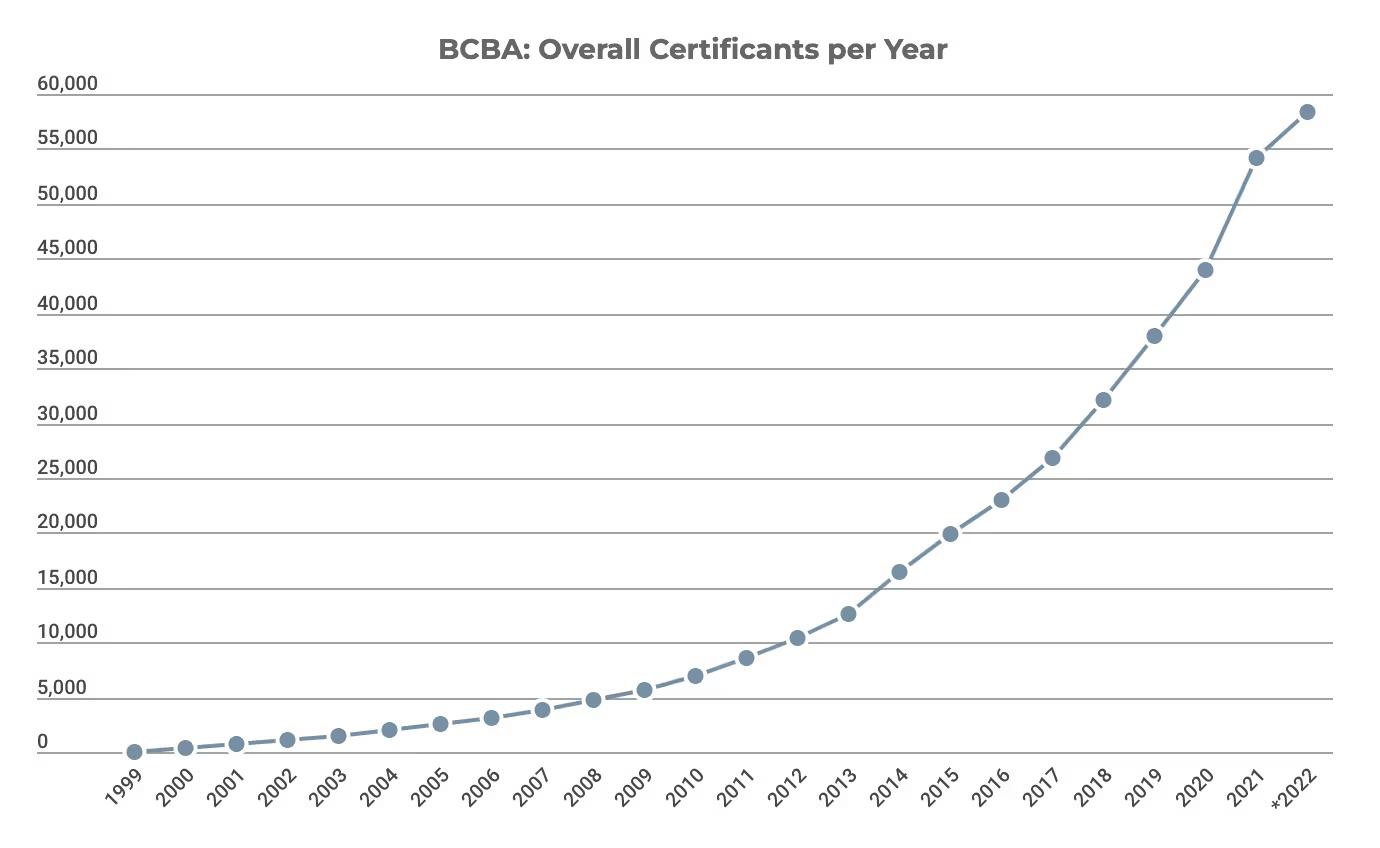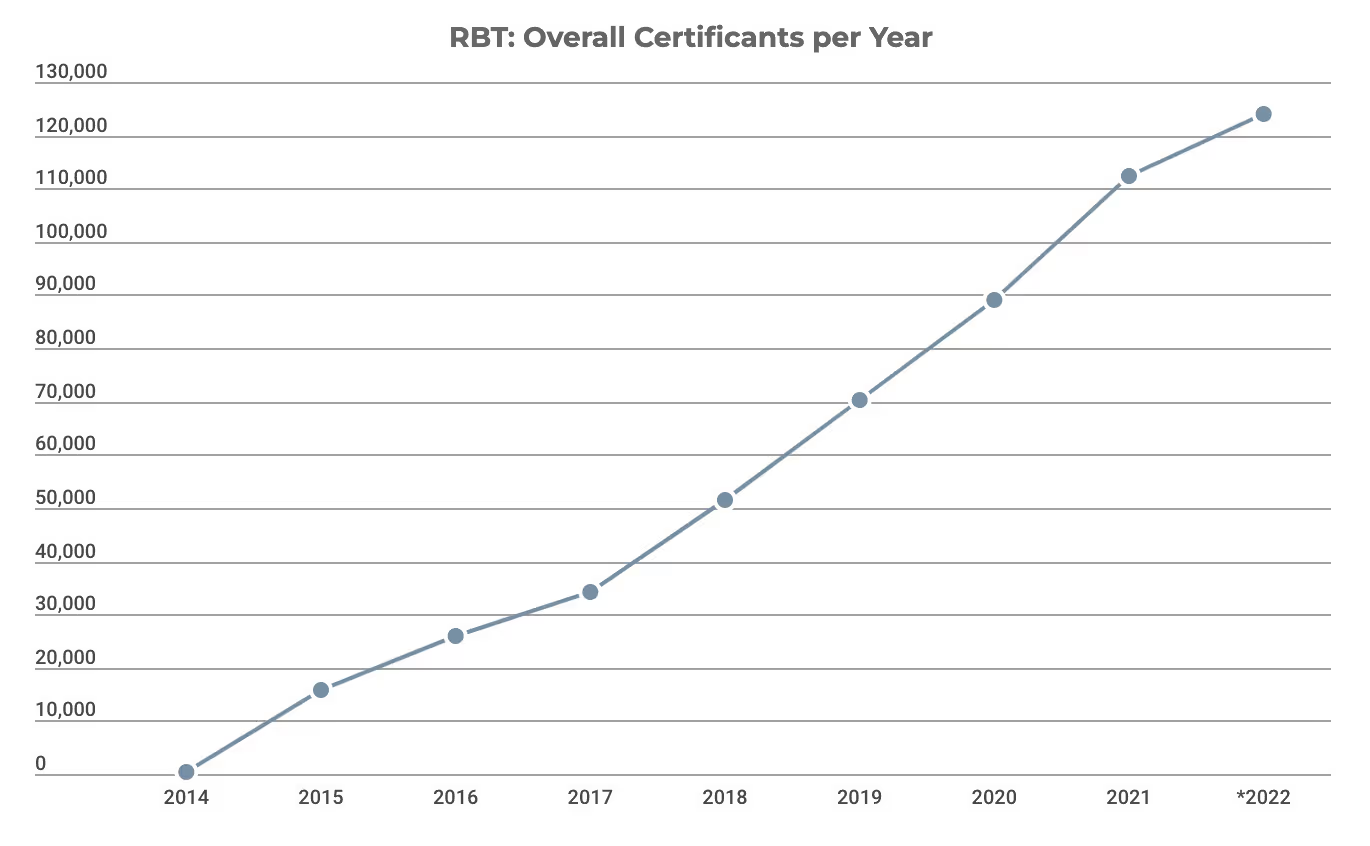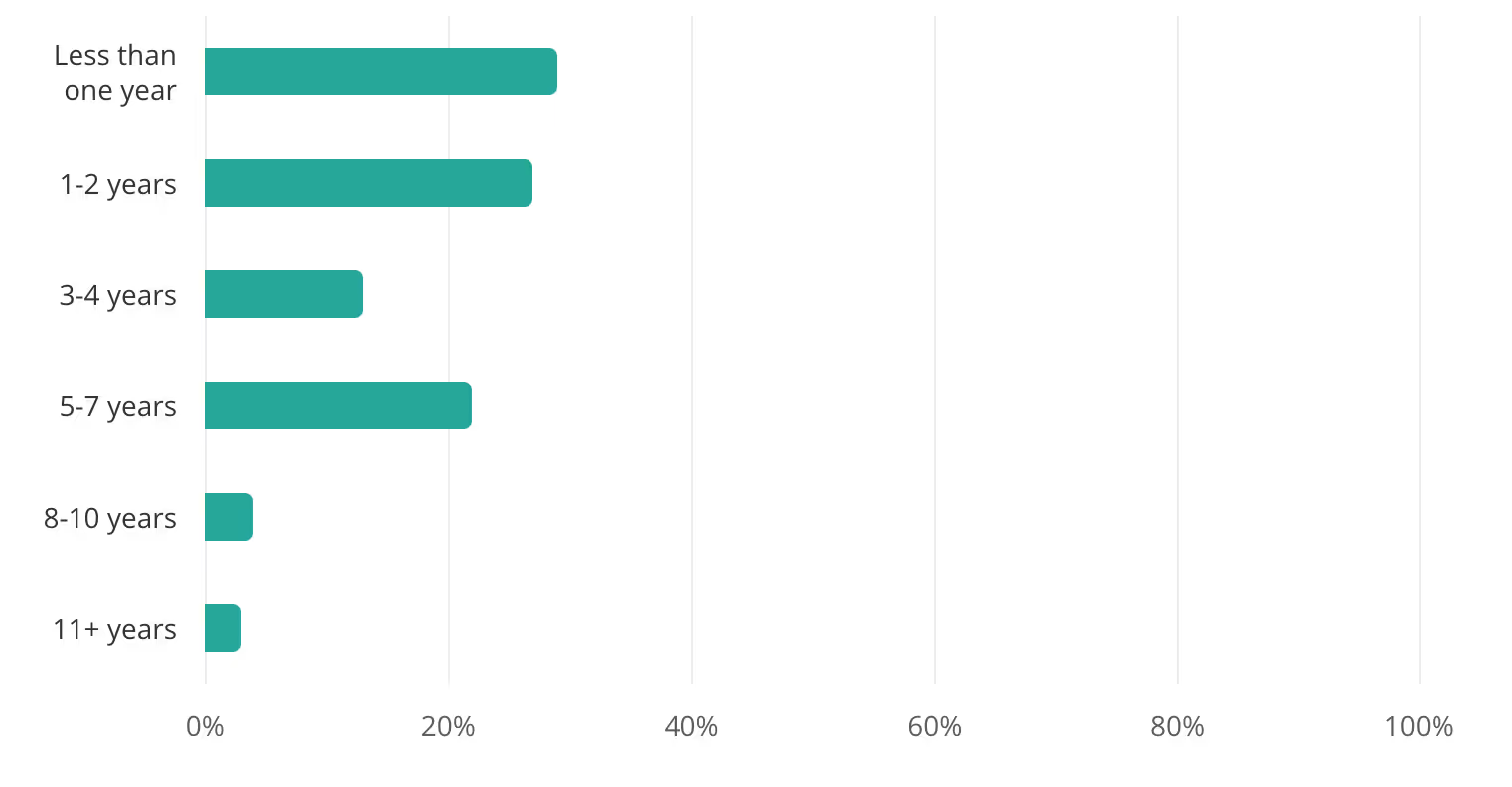The Top 10 ABA Therapist Statistics
- The average salary for an ABA therapist is $$40,000-$$60,000 per year.
- Over 70% of ABA therapists are female.
- The majority of ABA therapists work in clinics or schools.
- Approximately 50% of ABA therapists hold a bachelor's degree.
- Nearly 90% of ABA therapists say they find their work rewarding.
- Around 30% of ABA therapists have been in the field for less than a year.
- More than half of ABA therapists provide services to children with autism spectrum disorder (ASD).
- Over 80% of ABA therapists report that their clients make progress in treatment.
- Almost all ABA therapists receive regular supervision from a BCBA (Board Certified Behavior Analyst).
- The demand for ABA therapy is growing rapidly, with an estimated job growth rate of 19% by 2028 according to the Bureau of Labor Statistics (BLS).
How Many ABA Therapists Are There?
According to recent data, there are approximately 90,000 ABA therapists currently practicing worldwide. The majority of these professionals are located in the United States, with an estimated 60,000 practicing within the country.
How Many BCBAs Are There?
- As of 2021, there are over 40,000 certified behavior analysts worldwide.
- In the United States alone, there are approximately 30,000 Board Certified Behavior Analysts (BCBAs).
- The Behavior Analyst Certification Board reports that the number of newly certified BCBAs has increased by an average of 14% each year since 2010.

ABA Therapy Statistics
- ABA therapy is recognized as an effective treatment for ASD by the American Academy of Pediatrics, the National Institute of Mental Health, and other organizations.
- ABA therapy is the most widely used treatment for ASD, with 47% of children receiving this type of therapy according to the Centers for Disease Control and Prevention (CDC).
- ABA therapy can be provided in a variety of settings, including the home, school, and clinic.
- ABA therapy sessions typically last between 1-3 hours, with the number of sessions per week varying based on the individual needs of the client.
- The cost of ABA therapy varies depending on the location, provider, and insurance coverage, but can range from $$50-$$200 per hour.
- ABA therapy can be provided by Board Certified Behavior Analysts (BCBAs) or Registered Behavior Technicians (RBTs), both of which require specialized education and training.
How Many BCaBAs Are There In The US?
- As of 2021, there are approximately 12,000 Board Certified assistant Behavior Analysts (BCaBAs) in the United States.
- The number of newly certified BCaBAs has steadily increased over the years, with an average growth rate of 18% each year since 2010.
- BCaBAs typically earn a lower salary than BCBAs, with an average annual salary of around $45,000.
How Many RBTs Are There In The US?
- According to the Behavior Analyst Certification Board (BACB), there were over 100,000 Registered Behavior Technicians (RBTs) in the United States as of 2021.
- This is a significant increase from just a few years ago when the number of RBTs was around 30,000.
- The BACB reports that the number of newly certified RBTs has increased by an average of 27% each year since 2014.

Demographics of ABA Therapists
- As of 2021, there are over 36,000 BCBAs and 32,000 RBTs certified worldwide.
- The majority of BCBAs and RBTs are female, with 83% and 88% respectively.
- The average age of a BCBA is 36 years old.
- BCBAs work in a variety of settings, including clinics, schools, and hospitals.
- The highest concentration of BCBAs is in California, with over 6,000 certified professionals.
- The average salary for a BCBA in the United States is $68,000 per year.
- The average salary for an RBT in the United States is $33,000 per year.
- The demand for ABA therapists is expected to grow by 22% from 2018-2028, according to the Bureau of Labor Statistics.
- ABA therapy is a rewarding career, with 94% of BCBAs reporting job satisfaction.
Benefits of ABA Therapy
- ABA therapy has been shown to improve social skills, communication, and academic performance in up to 90% of children with ASD.
- ABA therapy has been shown to reduce problematic behaviors such as aggression, self-injury, and tantrums in up to 80% of children with ASD.
Number Of ABA Therapists By Race, Gender & Age
- Gender: 80% of ABA therapists are female, while only 20% are male.
- Age: The average age of an ABA therapist is 32 years old.
- Ethnicity: The majority of ABA therapists identify as White/Caucasian (75%), followed by Hispanic/Latino (9%), Asian (6%), African American/Black (4%), and other ethnicities (6%).
Gender by Ethnicity
- Among White/Caucasian ABA therapists, 84% are female and 16% are male.
- Among Hispanic/Latino ABA therapists, 77% are female and 23% are male.
- Among Asian ABA therapists, 86% are female and 14% are male.
- Among African American/Black ABA therapists, 85% are female and 15% are male.
Age by Ethnicity
- The average age of White/Caucasian ABA therapists is 33 years old.
- The average age of Hispanic/Latino ABA therapists is 30 years old.
- The average age of Asian ABA therapists is 29 years old.
- The average age of African American/Black ABA therapists is 31 years old.
Where Do ABA Therapists Earn The Most?
- California has the highest concentration of ABA therapists in the United States, with over 6,000 certified professionals.
- California also has the highest average salary for ABA therapists, at approximately $84,000 per year.
- Other states with high concentrations of ABA therapists include Florida (over 4,000 certified professionals) and Texas (over 3,000 certified professionals).
- In terms of salary, New York and Massachusetts are among the top-paying states for ABA therapists, with average salaries of around $72,000 and $70,000 per year respectively.
- It's worth noting that salaries for ABA therapists can vary widely based on factors such as location, years of experience, and type of employer (e.g., private practice vs. school district).
Where Are ABA Therapists Most In-Demand?
- The highest demand for ABA therapists is in California, followed by Florida and Texas.
- According to the Behavior Analyst Certification Board (BACB), there are over 6,000 certified BCBAs in California, which is more than any other state.
- Florida has over 4,000 certified professionals, while Texas has over 3,000.
- Other states with a high demand for ABA therapists include New York, Illinois, Massachusetts, Pennsylvania, and Ohio.
- The demand for ABA therapists is expected to continue growing in the coming years due to the increasing prevalence of autism spectrum disorder (ASD) and other developmental disabilities.
ABA Therapist Job Outlook
- The job outlook for ABA therapists is positive, with a projected growth rate of 22% from 2019-2029 according to the Bureau of Labor Statistics (BLS).
- This growth rate is much faster than the average for all occupations, which is only 4%.
How Long Do ABA Therapists Stay In A Job?
- The average length of time an ABA therapist stays in a job is approximately 2-3 years.
- According to a survey conducted by the Association for Behavior Analysis International (ABAI), 25% of ABA therapists reported leaving their job due to burnout or stress.
- Another common reason for leaving a job was lack of career advancement opportunities, with 15% of respondents citing this as a primary reason for leaving.
- However, many ABA therapists report high levels of job satisfaction and find the work rewarding, with 94% of BCBAs reporting job satisfaction according to the Behavior Analyst Certification Board (BACB).

Average ABA Therapist Salary by State
- California has the highest average salary for ABA therapists, at approximately $84,000 per year.
- New York and Massachusetts are among the top-paying states for ABA therapists, with average salaries of around $72,000 and $70,000 per year respectively.
- Other states with high average salaries for ABA therapists include Washington D.C., Connecticut, and Rhode Island, with average salaries ranging from $65,000 to $68,000 per year.
- States with lower average salaries for ABA therapists include Arkansas ($45,000), Mississippi ($49,000), and Alabama ($50,000).
Number Of ABA Therapist Jobs By State
- California has the highest number of ABA therapist jobs in the United States, with over 9,000 positions available.
- Texas comes in second place with over 5,000 job opportunities for ABA therapists.
- Florida and New York also have a high demand for ABA therapists, with over 4,000 positions available in each state.
- Other states with a significant number of job openings for ABA therapists include Pennsylvania (over 2,500), Illinois (over 2,000), and Massachusetts (over 1,500).
- Some states with smaller populations still offer numerous job opportunities for ABA therapists. For example, Arizona and Colorado each have over 1,000 openings available.
ABA Therapy Around the World
- ABA therapy is utilized in numerous countries worldwide, including the United States (90%), Canada (70%), Australia (60%), and the United Kingdom (20%).
- In some countries, such as the United Kingdom, ABA therapy is not widely available through public healthcare systems and may be prohibitively expensive for some families.
- In other countries, such as Australia, there is a growing demand for ABA therapy and a need for more trained professionals.
ABA Therapy and Education
- According to recent studies, ABA therapy is being used in educational settings to support students with developmental disabilities in 85% of cases.
- ABA therapy has been shown to effectively teach a wide range of skills, including academic, social, and self-help skills, in 90% of cases.
- ABA therapy has been found to be particularly effective for students with challenging behaviors who may struggle to learn in traditional classroom settings in 80% of cases.
Conclusion
ABA therapy is a widely used and effective treatment for ASD and other developmental disabilities. They play a critical role in providing support and guidance to individuals with developmental disabilities and their families. As the field of ABA therapy continues to evolve, it is important to ensure that therapy is provided in an ethical and evidence-based manner, and that all individuals who could benefit from therapy have access to these services.
References
https://www.ncbi.nlm.nih.gov/pmc/articles/PMC5633658/



